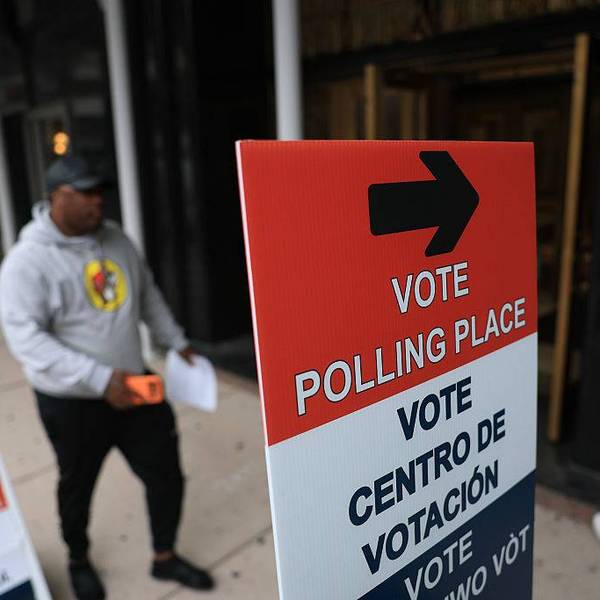WASHINGTON - Western governments, eager to pursue their political or economic interests, too often reward self-proclaimed and flawed "democracies" that clearly abuse the political and civil rights of their citizens, according to the latest edition of Human Rights Watch's annual "World Report" released here Thursday.
The mere holding of elections does not make a state democratic, according to the report. Yet both the United States and the European Union (EU) have used such exercises to justify aid and closer ties to friendly or potentially useful governments, according to the report.
"It seems Washington and European governments will accept even the most dubious election so long as the 'victor' is a strategic or commercial ally," said HRW director Kenneth Roth, author of the report's introduction.
In doing so, they undermine the causes of both democracy and human rights, according to the 569-report.
"(I)f dictators can get away with calling themselves 'democrats,' they will have acquired a powerful tool for deflecting pressure to uphold human rights," Roth wrote. "It is time to stop selling democracy on the cheap and to start substituting a broader and more meaningful vision of the concept that incorporates all human rights."
One of the most dramatic examples in 2007 was U.S. President George W. Bush's endorsement of Pakistani President Gen. Pervez Musharraf as "somebody who believes in democracy" and his government as having put the country "on the road to democracy", even after the former army chief declared "emergency rule", fired the supreme court, and arrested thousands of opposition activists.
"(I)f, unlike human rights law, 'the road to democracy' permits locking up political opponents, dismissing independent judges, and silencing the independent press, it is easy to see why tyrants the world over are tempted to believe that they, too, might be eligible," according to Roth.
"As such unworthy claimants as the leaders of Egypt, Ethiopia, Kazakhstan, and Nigeria wrap themselves in the democracy mantle with scant international objection, the concept of democracy gets cheapened, its human rights component cast aside."
The report, which covers significant human rights developments during 2007 in 75 countries worldwide, drew particular attention to the worsening humanitarian crisis in Somalia and the Ogaden region of Ethiopia and the continuing violence in the Darfur region of Sudan where it said the Khartoum government bears much of the blame.
In Asia, it noted the use of deadly force by Burma's military government to put down peaceful protests by monks, students, and ordinary citizens last summer; and the heavy fighting and rising civilian toll in the longstanding civil conflict in Sri Lanka.
It also stressed that this summer's Olympic Games in Beijing offered a key opportunity for the international community to push Chinese leaders to improve their human rights record.
Roth's introduction, however, effectively revives a generation-long debate between the traditional human rights movement, which has long argued that respect for internationally defined human rights would inevitably lead to the creation of democratic institutions, and mainly neo-conservative, "pro-democracy" activists who have historically placed a premium on elections as the launching pad for democratic reform.
That debate was launched in the early 1980s when elections held in violence-torn El Salvador were used by the administration of former President Ronald Reagan to justify lavishing hundreds of millions of dollars in mostly military aid to support a government whose security forces were killing hundreds of suspected opponents each month.
Elliott Abrams, who was Reagan's assistant secretary of state for human rights at the time, currently serves as Bush's deputy national security advisor for global democracy strategy.
In his essay entitled "Despots Masquerading as Democrats", Roth implicitly takes up the old debate, noting that, while international human rights law is codified in various international covenants and guarantees basic democratic principles, such as universal and equal suffrage, freedom of the press, assembly, and the rights of minorities, no comparable document lays out the basic conditions for democracy.
"The meaning of democracy lies too much in the eye of the beholder," he writes, thus making it ripe for misuse and misrepresentation both by dictators and western governments that support them.
"It's now too easy for autocrats to get away with mounting a sham democracy," Roth said. "That's because too many western governments insist on elections and leave it at that. They don't press governments on the key human rights issues that make democracy function -- a free press, peaceful assembly, and a functioning civil society that can really challenge power."
Particularly problematic has been the Bush administration itself which offers a "troubling parallel to abusive governments around the world". Its embrace of "democracy promotion as a softer and fuzzier alternative to defending human rights" is echoed in its own "deeply troubling" human rights record -- waterboarding and other "enhanced" interrogation methods, denial of habeas corpus, secret detentions -- even as it has mostly retained democratic processes.
Moreover, the administration's own efforts to justify the Iraq invasion in terms of democracy promotion has handed dictators a whole new arsenal of reasons for resisting pressure for reform, not least the fear of the kind of chaos that was unleashed by Washington's occupation, according to the report.
Still, most autocrats remain eager to don the democratic mantle through "elections" whose flaws or unfairness western governments are often too willing to ignore.
Flaws documented in the report include fraud, as in recent elections in Chad, Jordan, Kazakhstan, Nigeria, Uzbekistan, and Zimbabwe; control of the electoral machinery, as in Azerbaijan, Bahrain, Malaysia, and Thailand; and blocking opposition candidates, as in Belarus, Cuba, Egypt, Iran, Israel in the occupied territories, Libya, Turkmenistan, and Uganda.
Governments have also resorted to political violence (Cambodia, Democratic Republic of Congo, Ethiopia, Lebanon, and Zimbabwe); curbs on media and civil society (Russia and Tunisia); and undermining the rule of law (China and Pakistan) to ensure the election results they prefer.
Western reaction -- or lack of it -- to election abuses, moreover, has naturally led to understandable charges of double standards, Roth noted. "These days,.. the U.S. government's vigorous criticism of democratic shortcomings tends to be reserved mainly for longtime adversaries or pariahs, such as Syria, Burma or Cuba. Washington has largely exempted such allies as Saudi Arabia, Tunisia, or Ethiopia, while its short-lived pressure on others, such as Egypt or Jordan, has waned."
Despite a deteriorating human rights record, including "extraordinary brutality" in suppressing an insurgency in the Ogaden, Ethiopia, he noted, is the U.S.'s biggest aid beneficiary in sub-Saharan Africa and a key ally in the "war on terror". It is also one of the EU's top aid recipients.
(c) 2008 Inter Press Service



